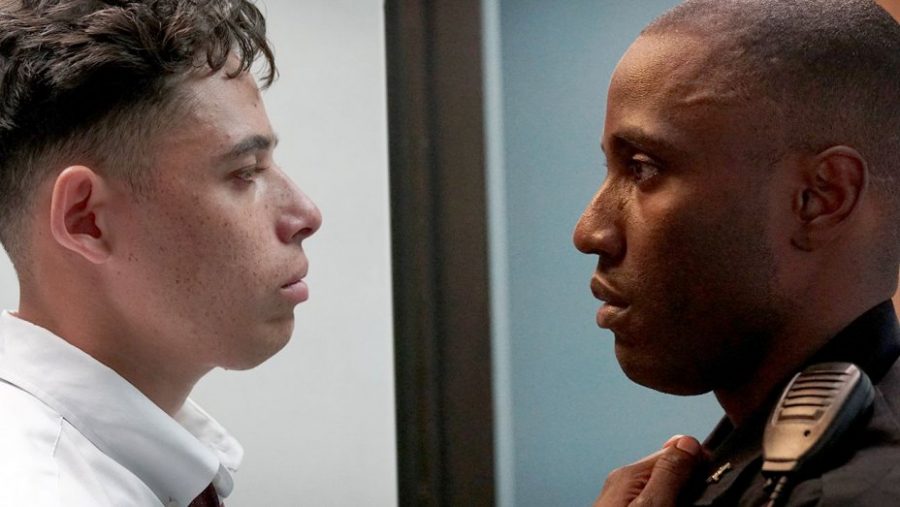Tisch Alumnus Talks Politically Charged Directorial Debut
Anthony Ramos and John David Washington in “Monsters and Men.”
October 1, 2018
“We have to have these difficult conversations in order to get past them,” writer-director Reinaldo Marcus Green said.
His debut feature-length movie “Monsters and Men” won the Special Jury Award for Outstanding First Feature at this year’s Sundance Film Festival.
Written and directed by the Tisch alumnus, the movie shares the connected stories of three men — a bystander, a police officer and a teenage athlete — as their Brooklyn community experiences a police shooting of an unarmed black man. Once the video of the killing becomes headline news, the neighborhood grapples with the personal tragedy and its larger social ramifications.
It was in a hotel room in Utah where Green found the inspiration for his award-winning film. Competing in the 2015 Sundance Film Festival with his short “Stop,” Green brought along his police officer friend who starred in the film. An argument ensued between the two about the aftermath of the killing of Eric Garner. Roughly two months prior, Garner’s death at the hands of law enforcement was one of many instances of police violence captured on video. A short clip showed Garner being choked to death by a white police officer after shouting over and over that he couldn’t breathe.
As saddening as it was to watch, the lifelong friends had two starkly opposing viewpoints on the nationally covered case.
“I saw someone who should be alive, while [my friend] saw someone who was resisting arrest,” Green said. “The conversation I had with my friend was uncomfortable, and I knew that if I was uncomfortable, I would be making other people uncomfortable, at least people who feel the way I do. It’s that discomfort that I think we need to get to. You have to have these uncomfortable conversations to sometimes get past them.”
The writer-director was caught off guard by his friend’s perspective, but the uncomfortable discussion prompted him to write “Monsters and Men.” Green hopes to provoke the question, “And then what?” when a problem like police brutality affects not only an individual but an entire community of people.
With his feature-length debut released in theaters across the U.S. starting on Sept. 28, Reinaldo Marcus Green is humble about his recent film achievements — especially considering he entered the industry so late in his career.
“Life took off once I made the decision with what I wanted to do with my life,” Green said, as he reflected back on his choice to quit his job on Wall Street to pursue his newfound love for filmmaking. Ultimately, however, Green credits his brother Rashaad, who exposed him to the medium, for his life-changing decision.
Green’s brother was the first of the two to enroll in NYU’s Graduate Film Program. Mastering the craft over three years in the program, his brother would often recruit his family as crew members for film projects. Green did not fully realize his adoration for the movie industry until he starred in his brother’s short film “Choices” that competed at Sundance. Journeying with his brother to the festival, Green was introduced to the thrill of the business that was too tempting to pass up.
By the age of 28, Green had enrolled in the NYU Graduate Film Program and, like his brother, began his journey into solidifying his filmmaking style.
“I saw films that I would’ve never seen [if I] hadn’t gone to NYU,” Green said. “And my palette changed. My taste for cinema — actually using the word cinema.”
The writer-director elaborated that his childhood fondness for blockbuster movies transformed into an interest in more niche styles like neo-realism. Relating his decision with his movie’s three protagonists, Green emphasized a lack of clear direction in life.
“Be brave in your decision [to pursue film],” Green said. “If you invest in yourself because you believe in yourself, then you win either way. And you know there’s no right or wrong path, in the same way in my film there’s no right or wrong path — there’s just your way. And I think having an unrelenting [sic] belief in your abilities is the first step.”
A version of this article appeared in the Monday, Oct. 1 print edition. Email Chris Delaney at [email protected].

























































































































































Carolyn Smith • Oct 1, 2018 at 10:39 pm
Enjoyed the article, Chris! Save a copy of the print edition.